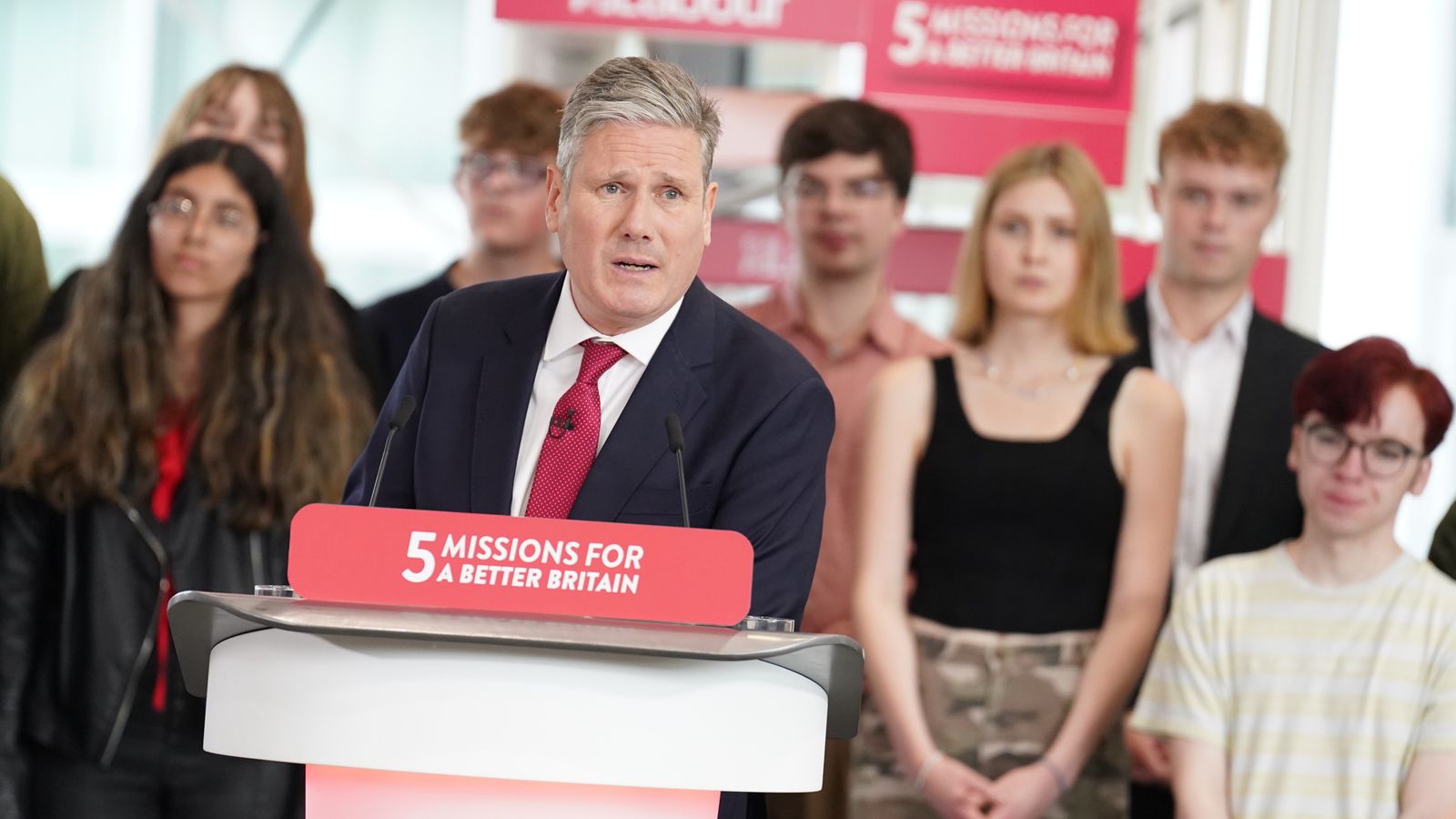With his pledge to reform education, Sir Keir has embarked on his most personal – and political – ambition yet

Breaking the “class ceiling” with the promise that a child’s start in life won’t determine where they end up. The last of Sir Keir Starmer’s five missions of a would-be Labour government is perhaps the most personal – and political – yet.
Personal because the Labour leader clearly sees himself as the embodiment of his mission to “tear down barriers of opportunity that hold people back”: his story began in a “pebble-dash semi” with working class parents and could end at Number 10 Downing Street as our next prime minister.
Bereaved COVID families criticise ‘desperate waste of time and money’ – politics latest
He was the first in his family to go to university and have a white collar profession, going on to become the head of the Crown Prosecution Service and a knight of the realm.
“Our core purpose and my personal cause is to fight – at every stage for every child – the pernicious idea that background equals destiny,” he told his audience at a higher education college in Kent. “Breaking that link, that’s what Labour is for. I’ve always felt it and it runs very deep for me.”
But it is political too: Sir Keir trying to prove to working class voters that this north London lawyer – he’s the third Labour leader in a row to hail from Camden or Islington – shares their values.
Please use Chrome browser for a more accessible video player
1:27
Starmer asked how Labour will level up schools
He is of the view that Labour has drifted too far from working people – not just in the run-up to 2019 when Boris Johnson seized Labour’s red wall, but in the decade before too. A big part of this for Sir Keir, then, was to try to speak to people who are disaffected or, as he says, his toolmaker father was, “disrespected” in a society that values academic qualifications over vocational ones.
While these five “missions” are sometimes criticised for being rather amorphous and lacking in detail, Sir Keir backed this one with a handful of clear policies and pledges: a focus on ‘oracy’ to give all children more confidence, an expansion of creative subjects to the age of 16 to broaden opportunities beyond narrow academia and a promise to have half a million children hitting early learning targets by 2030.
But even the most charitable observer would be hard-pressed to see how the measures Sir Keir announced on Thursday even approaches meeting his breathtaking goal. This is a Labour leader who wants nothing less than an end to the idea that your background will determine where you get to in life.
Advertisement
When asked by Sky News when he wanted to get state schools to the level of private schools, he told me he “hoped” to achieve that within five years of a Labour government.
Please use Chrome browser for a more accessible video player
1:16
Protesters interrupt Starmer speech
Is this would-be prime minister making promises he can’t keep?
It’s hard to see how. On the one hand, the gap between private and state school funding per pupil has doubled in the decade to the end of 2021, according to the Institute of Fiscal Studies, from a difference of £3,100 per pupil in 2010 to £6,500 in 2021. On the other, Sir Keir is clear that there isn’t a pot of money for Labour to pour into schools. As he said himself on Thursday, funding increases can only come through economic growth.
This raises obvious questions as to the mismatch between ambition and reality. Is this would-be prime minister making promises he cannot keep?
Read more on Sky News:
Who will win the next election? Latest polling – live tracker
What’s happening with Nigel Farage’s bank accounts?
Paul Whiteman, general secretary of the National Association of Headteachers said of Sir Keir’s plans: “If these ambitions are to be fulfilled, significant additional investment will be needed…it is right to have high ambitions, but schools must have the resources they need if they are to play their part in delivering them.”
Sir Keir knows this. But he too knows that promising big spending pledges opens up a flank on the economy that the Tories will seek to attack. He won’t take that risk.
On average, nineteen points ahead of Rishi Sunak in the polls and with an opponent who is struggling to deliver any of his own five pledges, Sir Keir has probably calculated that he doesn’t need to do much more than not mess up.
Around party conference in October, Labour’s likely to turn the five missions – growing the economy, safer streets, a better NHS, opportunity for all, and clean power – into more precise pledges. But don’t expect big promises on public services from this Labour party ahead of the election.
Sir Keir might talk about being a radical, but when it comes to an election he looks on course to comfortable win, he’s going to be very conservative.